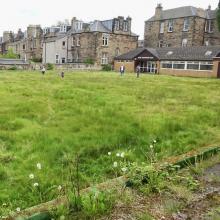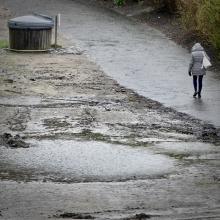
The City of Edinburgh Council has announced that it recognises the vital role of local government in addressing climate change. In May last year, it formally declared a climate emergency and committed to becoming a carbon-neutral city by 2030.
In November 2019, the Council launched an online survey to ascertain what Edinburgh residents think about the climate emergency, and what local actions should be taken to safeguard the planet for future generations.
That survey can be accessed HERE, and closes on 29 February.
Below, Spurtle team member David Sterratt shares his personal views on what should be done.
Establishing plans and targets
At the highest level, the Council's Climate Commission should draw up a ‘Zero Carbon Edinburgh’ plan, based on the structure of the Centre for Alternative Technology's ‘Zero Carbon Britain’ report.
The report would have specific plans and targets for all areas in which the city contributes to carbon emissions: various types of housing, transport, public buildings, and so on.
Here are three specific areas in which I have ideas:
- There should be action and research on a carbon-free plan for heating tenements. On the demand side, there should be a city-wide survey of fixing easy insulation issues (such as loft insulation), and free or heavily subsidised loft insulation should be offered for all tenements. There has been some research on insulating historic tenements, and there needs to be a programme of using the findings from this research to develop a set of standard insulation techniques applied to tenements, and training a workforce to install this insulation. Subsidies are required to get this project off the ground. On the supply side, air-source heat pumps aren’t likely to work, but could communal ground-source heat pumps with pipes buried in the back green work? It might also be possible to ask architects to imagine how we could extend tenements to improve both their thermal performance and utility; for example, by installing ‘solar balconies’ at the rear of the buildings.
- The condition of tenement housing stock is poor, and extreme weather events will exacerbate problems still further. Surveying buildings does not happen enough. Could there be a city-funded mass-survey programme, perhaps using drones to take images, using AI pattern recognition methods to highlight areas of concern, and employing professional surveyors to follow up on issues? There is considerable scope for involving the city's universities in such a scheme, and it could fit well with the moves to ensure tenements have surveys every five years (Issue 291).
- Complete electrification of all city bus routes by 2030 should be a target. One technology (trolleybuses) is mature, having existed for over 100 years. With developments in battery technology there could be partial electrification of routes, so trolleybuses could run on battery in the city centre and at the ends of routes. This would mean buses could have lighter batteries than if they ran on batteries alone.
Got a view? Tell us at spurtle@hotmail.co.uk and @theSpurtle and Facebook
------------
Mark Provan @MarkProvanP. Replying to @David Sterratt Thankfully most benefits of trolleybuses will happen by default with battery buses. China already leading the way.
David Sterratt @DavidSterratt. I'm sceptical about pure battery buses. "In motion charging" might be the ideal for heavily used routes in places with colder winters for the foreseeable.



